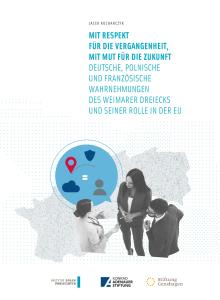"Respect the past, but look towards the future"
The Weimar Triangle as a platform for cooperation between Poland, Germany and France was set up by the countries’ foreign ministers at a joint meeting in Weimar in August 1991. The leading idea of this initiative was to support the unification of Europe after the divisions of the Cold War. The Paris-Berlin-Warsaw axis of cooperation was to support the process of reconciliation between the East and West of Europe, overcoming mutual prejudices and barriers to community building. The successful process of the enlargement of NATO and EU structures confirms the effectiveness of political efforts and cooperation formats such as the Weimar Triangle. Since the beginning of this platform’s existence, the importance of people-to-people contacts, scientific and cultural exchanges have been emphasised. This has been confirmed by numerous trilateral youth exchanges, scientific projects and cooperation at local government level.
The Weimar Triangle is based on a political declaration, it has no permanent structures, secretariat or even fixed meeting dates. Its significance depends primarily on the political will of the current authorities. A meeting of foreign ministers was held to mark the 30th anniversary of the Triangle, but it had been eight years since the last meeting of ministers (for European affairs). In this format, both internal conflicts and common challenges facing the entire European Union are the subjects of focus. At present, these are – first and foremost – the fight against the pandemic and its consequences and the challenge of a fair energy transition and industrial change, without which we will not save our common planet from the devastation resulting from climate change. Other topics include the need to renew transatlantic relations and ensuring security in Europe in the face of growing threats.
Anniversaries are also a good opportunity to reflect on the successes and challenges of a given project. Hence, the idea to conduct surveys in Poland, Germany and France, during which we asked respondents about their assessment of relations in this trilateral constellation and their perception of the significance of this cooperation for further European Union integration. We also asked about personal experiences in contacts with people from Poland, Germany or France and about familiarity with the Weimar Triangle format. The results of the survey conducted by the Institute of Public Affairs on the initiative of the Konrad Adenauer Foundation and in cooperation with the Genshagen Foundation are presented in the report.
At a Glance
- The public’s interest in European and international politics varies across the three countries. A majority of German and Polish citizens declare their interest. Interest is considerably weaker in France, especially in comparison to Germany.
- Support for EU membership is strongest in Poland, followed by Germany. Just half of the French respondents support their country’s EU membership, with the undecided representing the second largest group. The percentage of opponents of membership is highest in France (21%), followed by Germany (16%) and is lowest in Poland (9%).
- Pluralities (but not majorities) would like to see more powers returned to member states to safeguard national sovereignty.
- Strengthening EU competences is supported by around one third of respondents in each country. In Poland, the percentage of respondents supporting strengthening EU competences is comparable to those who would like to see some powers returned to the national governments.
- German and French perceptions of the benefits of membership are relatively similar and differ from the Polish perceptions. The three most popular benefits indicated in Poland (freedom of movement, prosperity and economic growth) are less appreciated in both Germany and France, while Poles less often than Germans feel that EU a membership improves Poland’s international standing and relations with other countries. A relatively high percentage of the French respondents cannot indicate any benefits of membership.
- The respondents of all three countries indicate that Germany and France are two of the three most influential countries in the EU. Only 12% of Poles and even fewer German and French respondents think that Poland is among the three most influential member states.
- The publics in all three countries think that democracy and human rights, as well as high levels of prosperity, unite the citizens of the EU more than shared culture and religion.
- Clear majorities in all three countries consider the USA an important partner of the EU, with the French being relatively the most sceptical.
- The UK and Canada are perceived as important partners in all three countries, while the perceptions of Japan and India are more ambiguous.
- The respondents in all three countries are quite divided in their perceptions of Russia and China and there are no clear pluralities in regard to either country. Roughly similar percentages see Russia and China as partners and as strategic rivals of the EU, with nearly one third of respondents choosing a neutral rating. The most sceptical views on Russia are in Poland, while China is viewed most critically in France.
- There is an asymmetry between Germany and France on one hand, and Poland on the other as concerns mutual interest in the other countries’ state of affairs. The Germans and the French feel relatively well informed about each others’ domestic politics and society. In contrast, the interest in Polish affairs in Germany and, especially, in France is conspicuously lower.
- Relatively few Polish, German and French respondents would consider living in one of the other two countries. The largest percentages are Poles who would move to Germany (23%) and Germans who would move to France (19%).
- Germany seems to be the most popular destination for student exchange programs as 16% of both the Polish and French respondents have participated in such an exchange or have a relative who has. France is popular with Germans but less so with Poles, while the smallest but still notable groups of the French and Germans have studied in Poland. The percentages are considerably higher for the youngest respondents.
- A considerable part of the public opinion in the three countries is aware of partnerships between their regions or towns with partners in one of the other two countries. The awareness of Franco-German and German-Polish cooperation is higher than in the case of Polish-French partnerships, and relatively few respondents in all three countries can point to concrete outcomes of such partnerships.
- Germans and Poles see Polish-German relations as important for European integration (with a majority of Poles rating them as very important). The French public is more ambiguous and nearly half of the respondents feel unable to answer this question, with a plurality (29%) stating that they are somewhat important.
- Franco-German relations are seen as important by clear majorities of Germans, Poles and the French, with small minorities stating they are not important. Interestingly, more Poles (48%) than the French think these relations are very important.
- Franco-Polish relations are viewed as important in Germany and in Poland but less so in France, where just 7% think they are very important.
- A majority of the French and nearly half of the German respondents have never heard the term “the Weimar Triangle”, while only 12% of Germans and 4% of the French say they know what it refers to. On the contrary, a majority of Poles say that they have at least heard this term, and as many as 24% say they know its meaning.
- Strong majorities in Poland and Germany think that Weimar Triangle cooperation is important for EU integration and agenda setting. The number is significantly lower in France, where 48% think that Weimar Triangle cooperation matters, and just 11% consider it very important (less than half of the percentages in Germany and Poland).
- Most Poles (52%) and more than one third of Germans (36%) agree that the Weimar cooperation should be strengthened in the future, whereas the French remain somewhat less convinced (27%). Nonetheless, only a small minority in each country would like to see less cooperation.
- There is significant support for Weimar Triangle cooperation in a number of policy areas in all three countries. In particular, Germans and Poles strongly agree on cooperation to strengthen democracy both within and outside of the EU. The Poles would like to see stronger cooperation on economy and defence, while the Germans see the need to develop common European positions on policies towards Russia and China as very important. The French support joint actions on climate, EU democracy and post-pandemic healthcare cooperation relatively more than in other policy areas.
For the full report, click on the link to the right!




